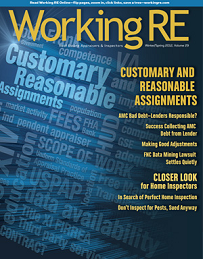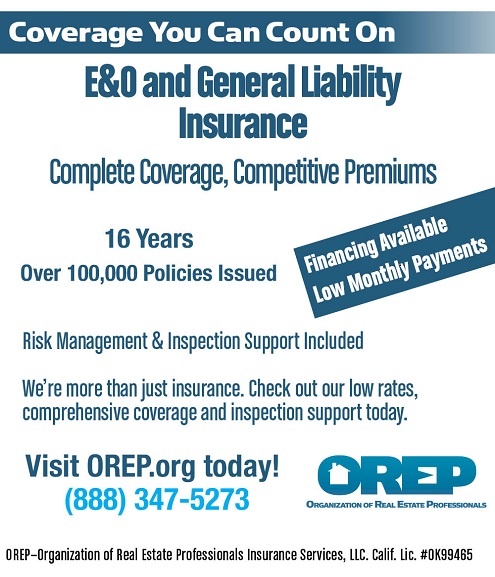
|
Home Inspectors Edition | Circulation 22,000 | Advertise | Subscribe | |
Published by OREP, E&O Insurance Experts | June 2012 |

|
|
As a home inspector,
you would never go to an inspection without all the tools, supplies and
information need. The same is true of selling: You must have a plan and be
prepared.
The Salesman Hat
By Amy McIntire
Our motto is that if you want business, you have to go out and create it. Which isn’t easy for home inspectors, since inspecting and selling are two different jobs and should be treated as such. Although, there are some similarities. As a home inspector, you would never go to an inspection without all the tools, supplies and information need. The same is true of selling: You must have a plan and be prepared. With a little preparation and planning, your sales hat will fit comfortably and even become enjoyable to wear.
Home inspectors don’t always react positively when I suggest open-house prospecting to build relationships with realty agents. But any sales coach will tell you to step out of your comfort zone and try something new. From experience, I know open-house prospecting can generate business if approached correctly. Remember, it is a sales call on a prospective referral source, and you must approach it as such or it can end up working against you. More than 50 percent of our current business comes from referrals from agents we met at open houses. Shouldn’t this be in your marketing plan, too?
Four things to plan and do before you go to an open house
1. Have
a positive attitude and smile!
This sounds simple, but when you are thinking of what you want to say,
you can forget to smile. So, stop and smile at yourself in the mirror
before you get out of the car. Wear your smile whenever you’re wearing
your salesman hat.
2.
Planning who you want to see is critical to time management.
Look in the paper or on company websites for open houses. Pick an area
and make a list of 10-15 potential stops. For each, include the time of
the open house, agent’s name, company name, open house address and town.
Locate the addresses on a map, then plan where to go first, second,
third, etc. On average, I see six-eight agents each Sunday. I’m not
speed prospecting, rather I’m developing relationships to get future
referrals.
(story continues below)

(story continues)
3. Plan what
to take.
Almost everyone likes sweets and chocolate, so take along a treat with
your business card, brochure, flyer or other marketing materials. Put it all
in something that is easy to carry and access. We use a small wooden basket
with handles that holds our chocolate-covered strawberries, business cards,
brochures, newsletter and a pen for taking notes. A small toolbox also would
be perfect for prospecting. The treat represents you, so make it something
special. I make chocolate-covered strawberries in the morning; package them
in baggies and tie our business card on top with a ribbon. Find something
that works for you that can become your signature treat.
Agents will remember you by it.
4. Plan
what to say.
This is extremely important! Break the sales call into five steps.
1) Greeting: Your greeting to the agent sets the tone for the conversation. Be upbeat and smile as you introduce yourself as a home inspector and add, “I came to see you!”
2) Quick company story: Write out a few sentences that you are comfortable with, memorize them to use when the agent asks about you. For example, “I have been an inspector for a few years now. I am an ASHI member and am based out of Smithville and serve the surrounding counties. I’ve worked in the construction field all my life and have many years of hands-on experience building and renovating homes. Becoming a home inspector was a natural fit for me!” (smile!)
3) Questions: This is your opportunity to find out lots of information. A salesperson knows that the person asking the questions is in control and that people like talking about themselves. Sample questions include:
• How long have you been in the real estate industry?
• Which office do you work out of?
• How do your clients choose a home inspector?
• Do you have a home inspector who you refer regularly?
• Does your office have a list of inspectors?
Who would I contact to be added to the list?
• On what day does your office have meetings?
Be comfortable asking questions, be patient and listen to the answers. The more prospective referral sources talk, the more you learn about them.
4) Company benefits, storytelling & countering objections: Every company has its own benefits. My partner, Terry, has a strong background in HVAC and construction, so we discuss how we are able to give our clients extra knowledge about the HVAC system in the home. Because there are two of us at the home inspection, we manage time and people well. You’ll want to tell a short story or two about your business to paint a visual picture and create a solid memory.
The biggest concern agents want to talk about is a home inspector being a “deal killer.” We know this even if they don’t bring it up. Instead of ignoring concern, discuss it and get it out of the way. Say with a smile, “I can’t change what I find at a home inspection (bad roof, broken furnace), but what I can do is make sure that any concern is delivered in a professional and non-threatening manner. I have a lot of experience working with people, and I know how to talk to them without scaring them.”
A second concern for the agents is how to nicely tell you they won’t use you. Tell them you know that. Say, “I heard it takes five-seven times meeting a real estate agent before I get a referral.” (You have their attention now.) Continue with, “I’m hoping that it only takes 3 or 4 times meeting YOU before a referral.” (smile) Now let them talk. This is when they will tell you how they met the home inspectors they are working with now and how it works for them.
5) Wrap-up and goodbye: Before you leave, you must get their business card or contact information. By this time, they should have all of your literature and the treat. If not, hand it to them and ask for their business card. Shake hands, tell them it was nice meeting them and that you are sure you will see them in the future. (smile!)
Three rules for
open houses
Most open
houses have few visitors so, for the most part, agents are glad to have
someone to talk to when you walk in. Respecting agents at their open
house is critical. There are three rules to follow to make your trip
worthwhile.
Rule
#1: Never create the impression you are there to see the house.
I
carry a basket with all my supplies. Most times, agents notice my basket
and know I’m there for a different reason. If they do start their sales
presentation about the house, I say, “It looks like a nice house, but we
already have one. I’m here to see you!” Smiling, of course.
Rule #2:
Know when to leave.
Leave on a high note. Get out while everyone is smiling and laughing.
After you are gone, hopefully they will read your literature as they eat
the chocolate. If the agent is involved in a deep discussion with a
possible client, leave your information, get theirs and leave. If there
are too many people at the open house, leave your information on the
counter, get the agent’s business card and leave. If an agent isn’t
there, be nice to whomever is there and leave. If the agent isn’t being
friendly, be courteous as you leave. If you do not have a positive
attitude about meeting new people, do not leave your home. Wait until
next week.
Rule #3:
Always get agent’s contact information and keep it organized.
Make a
contact book, which will be a tool for your
marketing plan. Tape the business cards to
notebook paper and write a few notes about
the
meeting. Keep these pages organized by
offices. This will help you remember who you
meet and when.
Good luck in your prospecting adventures!
We hope you take this information and create a prospecting presentation of your own.
About
the Author
Amy McIntire is an owner in TK Home Inspection with her inspector
partner, Terry Kleptach. Before home inspections, she was the director
of sales training for a 12-office, 125-person sales force based out of
Cleveland, Ohio. Since then, she has applied her sales knowledge and
tactics to grow their home inspection business. In the Salesman Hat
Series, Amy shares some of her knowledge and action steps to develop
relationships to get agent and broker referrals and more home
inspections. She can be reached for comment or questions at
terry@tkhomeinspection.com.
Copyright © ASHI Reporter. Reprinted with permission. This article originally appeared in the May 2012 issue of the ASHI Reporter. To learn more about the American Society of Home Inspectors go to www.ashi.org and www.ashireporter.org.
ATTENTION: You are receiving WRE Online News because you opted in at WorkingRE.com or purchased E&O insurance from OREP. WRE Online News Edition provides news-oriented content twice a month. The content for WRE Special Offer Editions is provided by paid sponsors. If you no longer wish to receive these emails from Working RE, please use the link found at the bottom of this newsletter to be removed from our mailing list.



